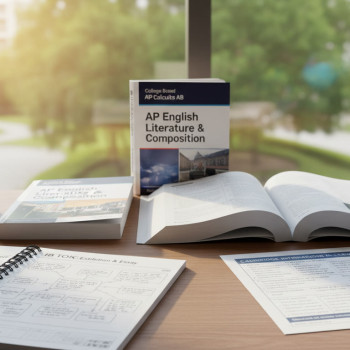Introduction: AP Scores Aren’t Just For Credit — They Can Help Pay for College
If you’ve spent late nights reviewing formula sheets, annotating primary sources, or mastering free-response timing, you probably already know that AP exams can earn you college credit and placement. But here’s something a lot of students don’t realize until later: AP scores can also open doors to real scholarship money. From institutional awards to national recognitions, AP performance can be a tangible line item in your financial aid story.

Why Colleges and Scholarship Programs Value AP Scores
AP exams are standardized, subject-specific measures of college-level skill. Colleges like scores because they signal readiness for advanced coursework; scholarship programs like them because they’re an objective data point in a sea of subjective application material. In short, a strong AP record can demonstrate:
- Academic rigor — you challenged yourself beyond the standard curriculum.
- Mastery in a subject — a top score suggests you can handle college work in that area.
- Positive yield signals — colleges use AP success to predict persistence and graduation.
These signals are why some institutions explicitly tie scholarships or merit awards to AP performance, and why other scholarship organizations may consider AP scores alongside GPA, essays, or extracurriculars.
Where to Look: Main Categories of Scholarships Connected to AP Scores
Not all scholarship opportunities that value AP scores advertise “AP” in the title. Look in these places first:
1. Institutional Scholarships (Colleges and Universities)
Many colleges maintain merit scholarships that consider AP performance in admissions holistic review or in separate scholarship criteria. These can take several forms:
- Automatic merit tiers: Admission + a high AP transcript can place you in a scholarship bracket.
- Departmental awards: Strong AP scores in a subject (like AP Calculus or AP Biology) may trigger departmental grants or early research opportunities with funding.
- Credit-based tuition reductions: Some schools award credit for high AP scores, effectively reducing the number of paid units you’ll need — which can save you tuition dollars indirectly.
Tip: Search each college’s financial aid and undergraduate admissions pages for keywords like “AP credit,” “merit scholarship,” and “advanced placement awards.” Many schools publish a credit and placement policy that clarifies how AP scores factor into tuition and scholarship calculations.
2. National and Programmatic Scholarships
Certain national awards or program scholarships explicitly recognize AP achievement. Examples include AP-specific recognitions that sometimes come with scholarship opportunities or nominations — think awards for AP Scholar distinctions or program-linked scholarships that target service, research, or capstone achievement.
- AP Scholar distinctions (awards based on multiple AP exam scores) often appear on transcripts and can be included in scholarship applications.
- Program-linked scholarships: Some AP initiative recognitions (for service or capstone projects) have associated scholarship competitions or prizes.
3. Local Scholarships and Community Foundations
Community organizations, local foundations, and high schools sometimes award scholarships based on demonstrated academic initiative. An AP score report or AP Scholar recognition is an easy objective metric you can use when applying to local awards.
- Tip: Ask your guidance counselor for lists of local scholarships and highlight AP success on any application form where academic rigor is a criterion.
4. Targeted Scholarships (Subject-Specific)
If you’re pursuing a field where AP exams mirror college majors, those subject APs can be persuasive. High scores in AP Computer Science, AP Chemistry, AP Calculus, or AP English can strengthen applications to STEM or humanities scholarships focused on subject-matter potential.
How to Find Scholarships That Consider AP Scores (Practical Search Steps)
Start systematic searching — don’t wait for opportunities to come to you. Here’s a simple plan you can execute in a weekend and then maintain periodically.
Step-by-step checklist
- 1. Build a list of target colleges you’re likely to apply to (reach, match, safety).
- 2. For each college, find their credit and placement policy and the merit scholarship pages.
- 3. Search departmental pages for subject-specific awards linked to AP performance.
- 4. Talk to your high school counselor about local scholarships; ask which awards consider AP recognition or require transcripts.
- 5. Include AP achievements in scholarship essays and resumes — be explicit about scores and how they prepared you for your intended major.
Key Tools and Data to Collect
When you’re evaluating a scholarship opportunity, gather the following so you can compare apples to apples:
| Data Point | Why It Matters | How to Get It |
|---|---|---|
| Minimum AP Score Required | Shows whether your current AP results qualify. | Check scholarship criteria or college credit policy page. |
| Type of Award | Merit, departmental, service-linked, or one-time prize — affects value and renewability. | Read the award description and FAQs. |
| Renewal Conditions | Whether you must maintain GPA or credit completion to keep the award. | Review the scholarship terms. |
| Application Requirements | Transcripts, essays, teacher recommendations, or nomination. | Checklist in the scholarship posting; ask the scholarship office when unclear. |
| Deadline | Missing a deadline means disqualification — mark it in your calendar. | Save deadlines in a scholarship tracker (spreadsheet or app). |
Real-World Examples and How Students Use AP Scores Strategically
Let’s look at three practical scenarios to make this concrete.
Scenario A: The STEM Major with High AP STEM Scores
A student with 5s in AP Calculus BC and AP Chemistry targets universities with strong engineering programs. They search departmental scholarship pages and highlight their AP scores in scholarship essays that emphasize readiness for advanced lab courses. The result: qualifying for a departmental merit award plus advanced placement that reduced tuition load in the first year.
Scenario B: The Humanities Student Leveraging AP Capstone or AP Research
A student with an AP Capstone diploma and a 4 on AP English Language uses the Capstone project as evidence of independent research in scholarship applications. Their AP recognitions strengthen essays about curiosity and independent work, opening doors to competitive foundation awards focused on research potential in the humanities.
Scenario C: The Local Scholar
A high school senior uses AP Scholar recognition and a consistent AP record to qualify for a local foundation scholarship that values academic rigor and community engagement. Because local awards have smaller applicant pools, objective signals like AP awards make a big difference.
How to Present AP Scores in Scholarship Applications
How you document AP success matters. Here’s how to package your AP story for maximum effect.
- Always use official AP score reports when required. They’re the authoritative record.
- On your resume and application, list the course, exam score, and the year (e.g., AP Calculus BC — 5, 2025).
- Use your personal statement to tie AP coursework to your intended major or to an example of growth: describe a lab in AP Physics that inspired your engineering interest, or a research question you explored in AP Research.
- If the scholarship requires proof of rigor, include AP coursework on your transcript and reference any AP Scholar awards or recognitions.
Common Questions Students Ask
Do AP Scores Automatically Give Me Scholarships?
No. AP scores may open eligibility or strengthen an application, but automatic scholarships tied strictly to scores are uncommon. What often happens is AP scores are one clear, standardized piece of evidence that colleges and scholarship committees use in evaluating candidates.
Can AP Scores Replace GPA or Essays?
They’re complementary. GPA, essays, recommendations, and extracurriculars still matter. Think of AP scores as a powerful supporting actor — they bolster the main performance (your overall application) but don’t replace it.
Is It Better to Send Scores Early or Wait?
Early score sends can demonstrate interest and preparedness; many students use the free score send that’s available each year before a June deadline. If you’re applying for scholarships with early deadlines, sending scores early ensures committees see your objective achievements in time.
Checklist: Actionable Tasks to Chase AP-Linked Scholarships
- Create a scholarship tracker (spreadsheet) and include fields: scholarship name, amount, deadline, AP score criteria, required documents, contact person.
- Request official AP score reports for scholarship applications that require verification.
- Draft a short paragraph for each scholarship application connecting AP coursework and scores to your future goals — keep it reusable but specific.
- Ask teachers to reference AP work in recommendation letters when appropriate.
- Check college departmental pages closely if you have strong scores in a major-related AP subject.
How Tutoring and Personalized Support Make a Difference
Preparing AP exams is both content-driven and strategy-driven. Personalized tutoring can accelerate growth in both. Services that offer 1-on-1 guidance, tailored study plans, and feedback cycles can make your prep more efficient — not only increasing the likelihood of higher scores but also helping you craft the story those scores will tell in scholarship applications.
For example, Sparkl’s personalized tutoring blends expert tutors with tailored study plans and AI-driven insights to identify your weakest topics and track progress. That targeted approach can convert a near-miss score into the threshold that makes you eligible for a scholarship or departmental award. And beyond scores, the mentorship you build with a tutor helps you identify scholarship-worthy projects, craft stronger essays, and select the right institutions to target.
Practical Timeline: When to Act During High School
Timing matters. Here’s a practical timeline from sophomore to senior year that balances AP preparation with scholarship readiness.
| When | What to Do | Why It Helps |
|---|---|---|
| Sophomore Year | Identify AP courses that align with your interests; begin building a record of rigor. | Early AP coursework sets a foundation and demonstrates long-term commitment to colleges and scholarship committees. |
| Junior Year | Take major AP exams; start researching college and scholarship policies; use free score send where appropriate. | Junior year scores are often used in early scholarship considerations and give you time for retakes if needed. |
| Summer Before Senior Year | Compile score reports, draft scholarship essays, and meet with counselors/tutors to polish applications. | Many scholarship deadlines fall in senior year; having materials ready reduces stress. |
| Senior Year | Apply to scholarships, send official scores as requested, and follow up with scholarship offices. | Senior-year scholarships are immediate financial supports for the upcoming college year. |
Tips for Maximizing Impact of AP Scores in Scholarship Applications
- Frame AP success as evidence of future contribution: scholarship committees want to know how you’ll add value to their campus or field.
- Use AP Research or Capstone projects as portfolio pieces when applying for research- or service-based awards.
- Consider retaking an AP exam if you need to cross a scholarship threshold — the payoff can be significant if the award is large.
- Highlight both the score and the story: what you learned, how you applied it, and where it’s taking you next.
Common Pitfalls and How to Avoid Them
Students often make a few predictable mistakes. Watch for these and adjust your plan:
- Assuming AP scores automatically create scholarships — they usually help but aren’t the sole factor.
- Failing to send official score reports on time — always check deadlines and score-sending policies.
- Not reading scholarship fine print — some awards may accept AP achievements but require additional proof or nomination.
- Overloading resume with scores without context — pairing AP success with specific projects or initiatives makes it meaningful.
Putting It All Together: A Short Case Study
Meet Maya (hypothetical). Maya scored 5 on AP Calculus BC, 5 on AP Physics C, and 4 on AP Computer Science. She targeted engineering schools and set these priorities:
- Search departmental scholarships in engineering using her AP results as proof of readiness for advanced coursework.
- Sent official scores early (free score send) to her top-choice schools to be considered for admission-based merit awards.
- Used tutoring sessions to refine her scholarship essays, focusing on a robotics project she completed that linked directly to her AP coursework.
Outcome: Maya received a departmental scholarship at one university, advanced placement into sophomore-level classes (saving tuition on intro courses), and a smaller local scholarship that valued community STEM outreach. The combined impact reduced her first-year cost significantly.
Final Checklist Before You Apply
- Confirm which scholarships explicitly list AP criteria and which simply consider AP scores as part of the academic record.
- Order official AP score reports early enough to meet scholarship deadlines.
- Tailor essays to connect your AP preparation to the scholarship’s mission or the department’s priorities.
- Keep a clean, organized tracker of deadlines, materials submitted, and follow-up contacts.
- Consider personalized tutoring or mentoring (such as Sparkl’s 1-on-1 guidance) if you want targeted score improvement and application coaching.

Parting Thought: AP Scores Are a Tool — Use Them Intentionally
AP scores aren’t magic, but they are powerful. When used intentionally — paired with a clear scholarship strategy, deliberate presentation, and sometimes a little help from a tutor — those scores can translate into meaningful financial relief. Start early, keep records, and tell the story your AP work supports: one of preparation, curiosity, and readiness to contribute to a college community.
If you’re feeling uncertain about which scholarships to pursue or how to present your AP achievements, consider reaching out for focused help. A tailored study plan and mentorship can sharpen not only your exam performance but how you frame that performance to scholarship committees — turning your hard work into opportunities.
Ready to Turn AP Scores into Scholarships?
Begin by making a single list today: three colleges, three local scholarships, and three targeted essays you could adapt. That small step, repeated week by week, will convert scattered achievements into a coherent, scholarship-ready narrative. Good luck — your AP work is more valuable than you might think. Use it wisely, and it’ll pay dividends beyond the classroom.


















No Comments
Leave a comment Cancel